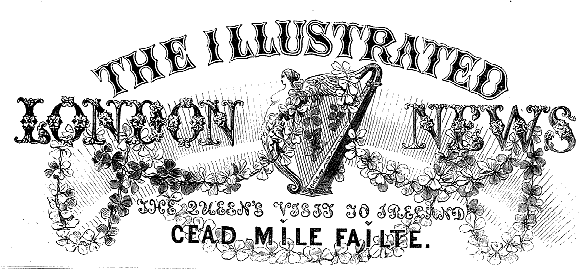
| THE ILLUSTRATED LONDON NEWS. |
[Dec. 22, 1849. |
![]()
CONDITION OF IRELAND:
ILLUSTRATIONS OF THE NEW POOR-LAW
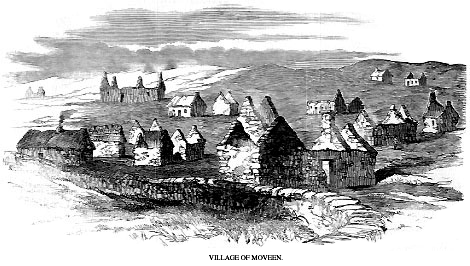
Having last week introduced this important subject to our readers, and given them some of the statistics of Kilrush, we shall henceforward allow our Correspondent to speak for himself:--
I assure you (he says) that the objects of which I send you Sketches are not sought after-- I do not go out of my way to find them; and other travelers who have gone in the same direction, such as Lord Adair, the Earl of Surrey, and Mr. Horsman, will vouch, I am sure, for the accuracy of my delineations. The Sketch of Moveen, to which I now call your attention, is that of another ruined village in the Union of Kilrush. It is a specimen of the dilapidation I behold all around. There is nothing but devastation, while the soil is of the finest description, capable of yielding as much as any land in the empire. Here, at Tullig, and other places, the ruthless destroyer, as if he delighted in seeing the monuments of his skill, has left the walls of the houses standing, while he has unroofed them and taken away all shelter from the people. They look like the tombs of a departed race, rather than the recent abodes of a yet living people, and I felt actually relieved at seeing one or two half-clad spectres gliding about, as an evidence that I was not in the land of the dead. You may inquire, perhaps, and I am sure your readers will wish to know, why it is that the people have of late been turned out of their houses in such great numbers, and their houses just at this time pulled down, and I will give you my explanation of this fact.
The public records, my own eye, a piercing wall of woe throughout the land-- all testify to the vast extent of the evictions at the present time. Sixteen thousand and odd persons unhoused in the Union of Kilrush before the month of June in the present year; seventy-one thousand one hundred and thirty holdings done away in Ireland, and nearly as many houses destroyed, in 1848; two hundred and fifty-four thousand holdings of more than one acre and less than five acres, put an end to between 1841 and 1848: six-tenths, in fact, of the lowest class of tenantry driven from their now roofless or annihilated cabins and houses, makes up the general description of that desolation of which Tullig and Moveen are examples. The ruin is great and complete. The blow that effected it was irresistible. It came in the guise of charity and benevolence; it assumed the character of the last and best friend of the peasantry, and it has struck them to the heart. They are prostrate and helpless. The once frolicsome people-- even the saucy beggars-- have disappeared, and given place to wan and haggard objects, who are so resigned to their doom, that they no longer expect relief. One beholds only shrunken frames scarcely covered with flesh-- crawling skeletons, who appear to have risen from their graves, and are ready to returned frightened to that abode. They have little other covering than that nature has bestowed on the human body-- a poor protection against inclement weather; and, now that the only hand from which they expected help is turned against them, even hope is departed, and they are filled with despair. Than the present Earl of Carisle there is not a more humane nor a kinder-hearted nobleman in the kingdom; he is of high honor and unsullied reputation; yet the Poor-law he was mainly the means of establishing for Ireland, with the best intentions, has been one of the chief causes of the people being at this time turned out of their homes, and forced to burrow in holes, and share, till they are discovered, the ditches and the bogs with otters and snipes.
The instant the Poor-law was passed, and property was made responsible for poverty, the whole of the landowners, who had before been careless about the people, and often allowed them to plant themselves on untenanted spots, or divide their tenancies-- delighted to get the promise of a little additional rent-- immediately became deeply interested in preventing that, and in keeping down the number of the people. Before they had rates to pay, they cared nothing for them; but the law and their self-interest made them care, and made them extirpators. Nothing less than some general desire like that of cupidity falling in with an enactment, and justified by a theory-- nothing less than a passion which works silently in all, and safely under the sanction of a law-- could have effected such wide-spread destruction. Even humanity was enlisted by the Poor-law on the side of extirpation. As long as there was no legal provision for the poor, a landlord had some repugnance to drive them from every shelter; but the instant the law took them under its protection, and forced the landowner to pay a rate to provide for them, repugnance ceased: they had a legal home, however inefficient, to go to; and eviction began. Even the growth of toleration seems to have worked to the same end. Till the Catholics were emancipated, they were all-- rich and poor, priests and peasants-- united by a common bond; and Protestant landlords beginning evictions on a great scale would have roused against them the whole Catholic nation. it would have been taken up as a religious question, as well as a question of the poor, prior to 1829. Subsequent to that time-- with a Whig administration, with all offices open to Catholics-- no religious feelings could mingle with the matter: eviction became a pure question of interest; and while the priests look now perhaps, as much to the Government as to their flocks for support, Catholic landlords are not behind Protestant landlords in clearing their estates. English notions and English habits, without any reference to the causes of English greatness-- which are not to be found in a Poor-law and farms of a particular size-- impressed law-makers and the landlords of Ireland with a strong desire to enlarge and consolidate farms, and clear them of the squatters and subtenants, who had formerly been permitted, if not encouraged. With a Poor-law, that desire could be safely acted on, and so it supplies a temptation and the means to carry eviction extensively into effect.
The evictions were numerous before the potato rot. It was not that great calamity, therefore, that super induced them, it was the chief cause of the present desolation. The potato harvest and harvests of every kind have been lost many times before 1846, without reducing the people to their present misery. But that calamity threw the people at the mercy of the Government, and the Government used its power directly and indirectly, in accordance with the theory, to clear the land. Out-door relief was established in that season of distress, and relief altogether was coupled with the resignation of the land. The poor were required to give up their heritage, small though it were, for less than a mess of pottage. A law was passed, the 11 and 12 Vic. c. 47, entitled, "An Act for the Protection and Relief of the Destitute Poor Evicted from the Dwellings," which provided a means of evicting them, subjecting the landlords to the necessity of giving notice to Poor-law guardians, and to the share of a common burden. Under such stimuli and such auspices, the clearing process has gone on in an accelerated ratio, and Ireland is now dotted with ruined villages, and filled with a starving population, besieging the doors of crowded workhouses, and creeping into the halls and chambers of the deserted mansions of the nobility and gentry. A gentleman's mansion turned into a poor-house, is a fit emblem of the decay that a mistaken policy has brought on all classes. The system intended to relieve the poor, by making the landlords responsible for their welfare, has at once made it the interest, and therefore the duty, of the landlords to get rid of them. Extirpation is accordingly going forward at a rapid rate; and the evidence of that is now placed before the eyes and the understanding of the readers of the ILLUSTRATED LONDON NEWS.
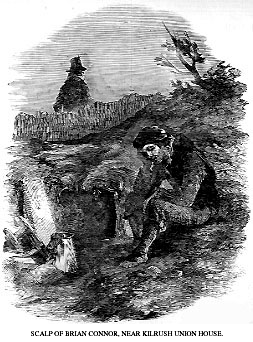 I will give you, by-and-bye, some
notices of driving for rent, of landowners impoverished by rates, and of
bankrupt unions; but at present I must draw attention to some of the other
Sketches I send. The Scalp of Brian Connor (here represented) has been
already described; it is another illustration of the worse than pig-sty
habitations of those who did live in the now roofless cottages. Another Sketch
follows (of Miss Kennedy), which shows that, amidst this world of wretchedness,
all is not misery and guilt. Indeed, it is a part of our nature that the
sufferings of some should be the occasion for the exercise of virtue in others.
Miss Kennedy (about seven years old) is the daughter of Captain Kennedy, the
Poor-law Inspector of the Kilrush Union. She is represented as engaged in her
daily occupation of distributing clothing to the wretched children brought
around her by their more wretched parents. In the front of the group I noticed
one woman crouching like a monkey, and drawing around her the only rag she had
left to conceal her nudity. A big tear was rolling down her cheek, with
gratitude for the gifts the innocent child was distributing. The effect was
heightened by the chilliness and dreariness of a November evening, and by the
wet and mire in which the naked feet of the crowd were immersed. On Captain
Kennedy being appointed to the Union, his daughter was much affected by the
misery of the poor children she saw; and so completely did it occupy her
thoughts, that, with the consent of her parents, she gave up her time and her
own little means to relieve them. She gave away her own clothes-- she was
allowed to bestow part of her mother's-- and she then purchased course
materials, and made up clothing for children of her own age; she was encouraged
by her father and some philanthropic strangers, from whom she received sums of
money, and whose example will no doubt be followed by those who possess property
in the neighbourhood; and she devoted herself with all the energy and
perseverance of a mature and staid matron to the holy office she has undertaken.
The Sketch will, I hope, immortalize the beneficent child, who is filling the
place of a saint, and performing the duties of a patriot.
I will give you, by-and-bye, some
notices of driving for rent, of landowners impoverished by rates, and of
bankrupt unions; but at present I must draw attention to some of the other
Sketches I send. The Scalp of Brian Connor (here represented) has been
already described; it is another illustration of the worse than pig-sty
habitations of those who did live in the now roofless cottages. Another Sketch
follows (of Miss Kennedy), which shows that, amidst this world of wretchedness,
all is not misery and guilt. Indeed, it is a part of our nature that the
sufferings of some should be the occasion for the exercise of virtue in others.
Miss Kennedy (about seven years old) is the daughter of Captain Kennedy, the
Poor-law Inspector of the Kilrush Union. She is represented as engaged in her
daily occupation of distributing clothing to the wretched children brought
around her by their more wretched parents. In the front of the group I noticed
one woman crouching like a monkey, and drawing around her the only rag she had
left to conceal her nudity. A big tear was rolling down her cheek, with
gratitude for the gifts the innocent child was distributing. The effect was
heightened by the chilliness and dreariness of a November evening, and by the
wet and mire in which the naked feet of the crowd were immersed. On Captain
Kennedy being appointed to the Union, his daughter was much affected by the
misery of the poor children she saw; and so completely did it occupy her
thoughts, that, with the consent of her parents, she gave up her time and her
own little means to relieve them. She gave away her own clothes-- she was
allowed to bestow part of her mother's-- and she then purchased course
materials, and made up clothing for children of her own age; she was encouraged
by her father and some philanthropic strangers, from whom she received sums of
money, and whose example will no doubt be followed by those who possess property
in the neighbourhood; and she devoted herself with all the energy and
perseverance of a mature and staid matron to the holy office she has undertaken.
The Sketch will, I hope, immortalize the beneficent child, who is filling the
place of a saint, and performing the duties of a patriot.

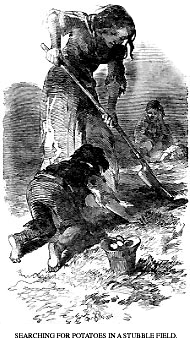 On all sides I hear praises of the
amiable child and her excellent father, and this is not without a moral for the
landlords. The public officers who are appointed to administer and control the
relief of the poor, have it in their power to do much for the people. Mere
kindness of manner, though they render no substantial assistance, endears them
to the suffering crowd. Captain Kennedy is at once kind, charitable, and
judicious. He is at the head of the Union. He fills for the people the most
important office in the district. He is the great man of the place. It must be
so in other districts. The funds are contributed by the landowners, but they are
distributed by public officers. Thus the Poor-law, which disposes of the
landowners' property, also deprives them of the pleasure and the burden of
distributing it themselves. A public officer is made, in fact, to administer
their estates, and he stands between them and their compulsory bounties,
securing the respect and confidence which they might and ought to have. The more
the subject is examined, the more, I have no doubt, it will be found that the
poor-law is as injurious to the landlords as it is to the people.
On all sides I hear praises of the
amiable child and her excellent father, and this is not without a moral for the
landlords. The public officers who are appointed to administer and control the
relief of the poor, have it in their power to do much for the people. Mere
kindness of manner, though they render no substantial assistance, endears them
to the suffering crowd. Captain Kennedy is at once kind, charitable, and
judicious. He is at the head of the Union. He fills for the people the most
important office in the district. He is the great man of the place. It must be
so in other districts. The funds are contributed by the landowners, but they are
distributed by public officers. Thus the Poor-law, which disposes of the
landowners' property, also deprives them of the pleasure and the burden of
distributing it themselves. A public officer is made, in fact, to administer
their estates, and he stands between them and their compulsory bounties,
securing the respect and confidence which they might and ought to have. The more
the subject is examined, the more, I have no doubt, it will be found that the
poor-law is as injurious to the landlords as it is to the people.
Searching for Potatoes is one of the occupations of those who cannot
obtain out-door relief. It is gleaning in a potato-field-- and how few are left
after the potatoes are dug, must be known to every one who has ever seen the
field cleared. What the people were digging and hunting for, like dogs after
truffles, I could not imagine, till I went into the field, and then I found them
patiently turning over the whole ground, in the hopes of finding the few
potatoes the owner might have overlooked. Gleaning in a potato-field seems
something like shearing hogs, but it is the only means by which the gleaners
could hope to get a meal.
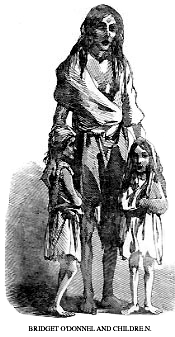 The Sketch of a Woman and Children
represents Bridget O'Donnel. Her story is briefly this:-- "I lived,"
she said, "on the lands of Gurranenatuoha. My husband held four acres and a
half of land, and three acres of bog land; our yearly rent was £7 4s.; we were
put out last November; he owed some rent. We got thirty stone of oats from Mr.
Marcus Keane, for seed. My husband gave some writing for it: he was paid for it.
He paid ten shillings for reaping the corn. As soon as it was stacked, one
"Blake" on the farm, who was put to watch it, took it away to his own
haggard and kept it there for a fortnight by Dan Sheedey's orders. They then
thrashed it in Frank Lellis's barn. I was at this time lying in fever. Dan
Sheedey and five or six men came to tumble my house; they wanted me to give
possession. I said that I would not; I had fever, and was within two months of
my down-lying (confinement); they commenced knocking down the house, and had
half of it knocked down when two neighbours, women, Nell Spellesley and Kate
How, carried me out. I had the priest and doctor to attend me shortly after.
Father Meehan anointed me. I was carried into a cabin, and lay there for eight
days, when I had the creature (the child) born dead. I lay for three
weeks after that. The whole of my family got the fever, and one boy thirteen
years old died with want and with hunger while we were lying sick. Dan
Sheedey and Blake took the corn into Kilrush, and sold it. I don't know what
they got for it. I had not a bit for my children to eat when they took it from
me."
The Sketch of a Woman and Children
represents Bridget O'Donnel. Her story is briefly this:-- "I lived,"
she said, "on the lands of Gurranenatuoha. My husband held four acres and a
half of land, and three acres of bog land; our yearly rent was £7 4s.; we were
put out last November; he owed some rent. We got thirty stone of oats from Mr.
Marcus Keane, for seed. My husband gave some writing for it: he was paid for it.
He paid ten shillings for reaping the corn. As soon as it was stacked, one
"Blake" on the farm, who was put to watch it, took it away to his own
haggard and kept it there for a fortnight by Dan Sheedey's orders. They then
thrashed it in Frank Lellis's barn. I was at this time lying in fever. Dan
Sheedey and five or six men came to tumble my house; they wanted me to give
possession. I said that I would not; I had fever, and was within two months of
my down-lying (confinement); they commenced knocking down the house, and had
half of it knocked down when two neighbours, women, Nell Spellesley and Kate
How, carried me out. I had the priest and doctor to attend me shortly after.
Father Meehan anointed me. I was carried into a cabin, and lay there for eight
days, when I had the creature (the child) born dead. I lay for three
weeks after that. The whole of my family got the fever, and one boy thirteen
years old died with want and with hunger while we were lying sick. Dan
Sheedey and Blake took the corn into Kilrush, and sold it. I don't know what
they got for it. I had not a bit for my children to eat when they took it from
me."
The last Sketch shows the Scalpeen of Tim Downs, at Dunmore, in the
parish of Kellard, where himself and his ancestors resided on the spot for over
a century, with renewal of their lease in 1845. He neither owed rent arrears or
taxes up to the present moment, and yet he was pitched out on the roadside, and
saw ten other houses, with his own, leveled at one fell swoop on the spot, the
ruins of some of which are seen in this Sketch. None of them were mud cabins,
but all capital stone-built houses.
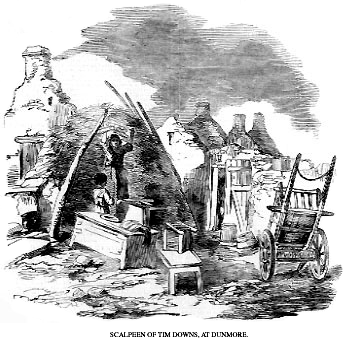 I must conclude my present
communication with an account of a great catastrophe, which has hurried 37 of
the poor wretches that depended on the Union of Kilrush, with four other
persons, into eternity. The Union will be relieved by an accident at which
humanity mourns:--
I must conclude my present
communication with an account of a great catastrophe, which has hurried 37 of
the poor wretches that depended on the Union of Kilrush, with four other
persons, into eternity. The Union will be relieved by an accident at which
humanity mourns:--
"On the evening of Wednesday week intelligence reached the town of Kilrush that a large number of persons, most of whom were paupers, who had been seeking out-door relief at Kilrush, were drowned while crossing the ferry on their return to Moyarta. No less than 33 dead bodies were washed ashore on the northern side of the ferry. They were removed to an adjacent field, and the coroner, Mr. Frank O'Donnell, arriving soon after from Kilkee, an inquest was held on their wretched remains. It appeared upon the inquiry that no less than 43 or 45 persons (for they could not tell the exact number), were allowed to crowd into a crazy and rotten boat, which had been plying on this ferry for the last forty years. The boat moved on as far as the middle of the ferry, when a sea broke over her stern, and filled her at once, the wind blowing strong from the south-west at the time. She upset instantly, and her miserable living freight were immersed in the merciless waters, while four (who were eventually saved) clung to her until a boat from Captain Cox's men came to their assistance. The verdict of the coroner's jury was as usual in such cases, but imputing gross neglect, and attaching censure to the owners of the boat, for admitting such a number of persons into so frail a craft. With the exception of four, the victims were all paupers who had frequently come into the town in vain to seek out-door relief, and were returning that sad evening to their wretched hovels in the parishes of Moyarta and Kilballyowen."
![]()